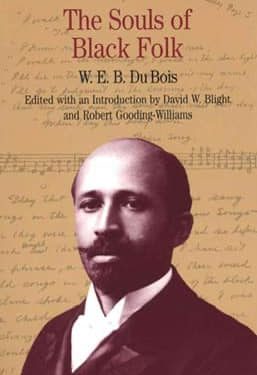On #BlackHistoryMonth My Notable Panafrican Books #3 of the series continues with W.E.B Du Bois, The Souls of Black Folks.
First published in 1903, W.E.B Du Bois’ The Souls of Black Folks is a masterpiece and an American classic that critically examined the years following the civil war, the issues of racism and race relations, economic inequities, political disenfranchisement and black leadership, importance of education, the significance of religion and the black church.
The Souls of Black Folks by W.E.B Du Bois concept that “the problem of the Twentieth Century is the problem of the color-line” is timeless and relevant today as it was then in 1903. Du Bois concept of life behind the veil of race and skin color, the sense of always looking at one-self through the eyes of others have become a cornerstone for thinking about race in America. However, this so-called double consciousness extends far beyond African Americans in America to blacks all over the world; the inferiority views of the self and supremacy views of others continues today with huge consequences on psyche of oppressed black people.
Through fourteen assays, Du Bois provided keen insights into the social, religious, economic, political and cultural conundrums of an American society deeply structured to favor one group at the expense of another. For instance, how a religious white America could be so entrenched in racism, on one hand, and how a deeply aggrieved Black America negotiated the same racism using the same religion. The souls of Black Folks by Du Bois is full of dichotomies through a variety of challenges faced by blacks in America.
On race and racism, Du Bois emphasized on visible and invisible consequences of the effects of it on the lives of black people. The visible consequences included separate spheres of life, physical abuse, and economic disenfranchisement, whereas the less visible and often more dangerous consequences were conflicted identity, self-hate, self-doubt, and a lack of industriousness and self-reliance.
Economic inequalities Du Bois believed had started from slavery when blacks worked without pay and through emancipation, when blacks worked with little pay. This essence prevented blacks from gaining generational wealth in any form.
As we question today the glaring absence of black leadership in the likes of Frederick Douglasses, Sojourner Truths, Martin Luther King Jrs., Malcolm Xs, and other Panafrican leaders , Du Bois questioned the leadership role of Booker T. Washington and his apologetic stance toward Whites during the period of the reconstruction. Such apologetic stance towards colonial masters and imperialists continues today in neoliberal clone educated Africans in the continent and globally. Du Bois noted the impact of Booker T. Washingtons apologetic theories had on a lot of African Americans, “”there is among educated and thoughtful colored men in all parts of the land a feeling of deep regret, sorrow, and apprehension at the wide currency and ascendancy which some of Mr. Washington’s theories have gained.” This is apt given that the apologetic intellectual likes of Booker T. Washington continue among blacks in America and around the world. Although many like Booker T. Washington and current neoliberal clones among black people maybe sincere and successful, they often lack the consciousness, conscientiousness and enlightenment to fully understand the consequences of their actions on the people.
On education, Du Bois emphasized the need for a diverse liberal arts education system for black people. However, he was very clear that those persons most equipped in character, integrity, dedication and consciousness should serve as leaders (The Talented Tenth) and he advocated for their continued skills development and enlightenment through a liberal arts education. The need for an enlightened, conscious, and character built.
Du Bois noted the significance of religion in helping to sustain and empower black people amidst issues of racism in America. Interestingly, the black church continues to this day be a source of rejuvenation and building resilience among black people in America. The parallels are profound for black people in Africa and elsewhere in the diaspora, where religion has become a haven, a source of resilience, and an opium for the poor suffering masses, who are subjected to daily structural violence.
William Edward Burghardt Du Bois (February 23, 1868 – August 27, 1963) was an American sociologist, socialist, historian, and Pan-Africanist civil rights activist. Du Bois was one of the founders of the National Association for the Advancement of Colored People (NAACP) in 1909. In 1895, he was the first African American to earn a Ph.D. from Harvard University. Du Bois attended the First Pan-African Conference, held in London on July 23–25, 1900, that ultimately led to the formation of the Panafrican Congress and activism that led to emancipation of several African countries. Du Bois died in Accra, Ghana and was given a state funeral on August 29–30, 1963, at President Nkrumah’s request, and was buried near the western wall of Christiansborg Castle (now Osu Castle), then the seat of government in Accra. Du Bois work, writings and activism made him one of the foremost Black intellectuals of his era with a global influence that shaped Panafricanism and activism across the world.
——
About the author: Dr. Alhaji Umar N’jai is a Senior Scientist, Associate Professor, Panafrican Scholar, Anthropologist, Founder & Chief Strategist of Project 1808, Inc, Koinadugu College, Kabala, Sierra Leone and Freelance writer ‘Roaming in the Mountains of Kabala Republic’. #Jata #Meejoh #ThePeoplesScientist @highlight






















